

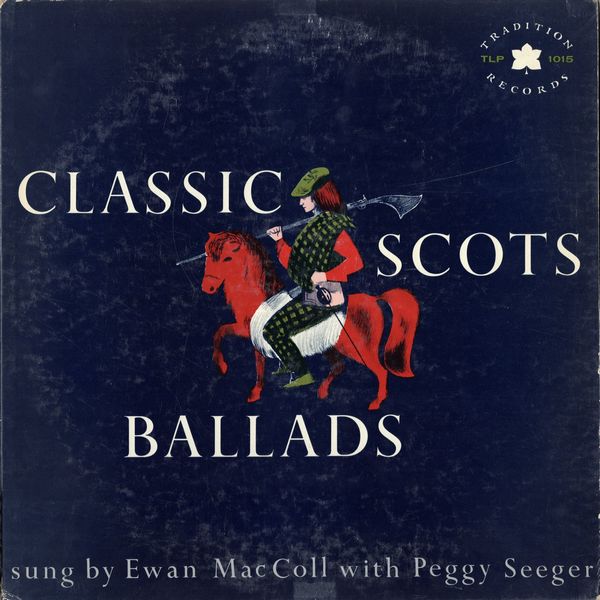 |
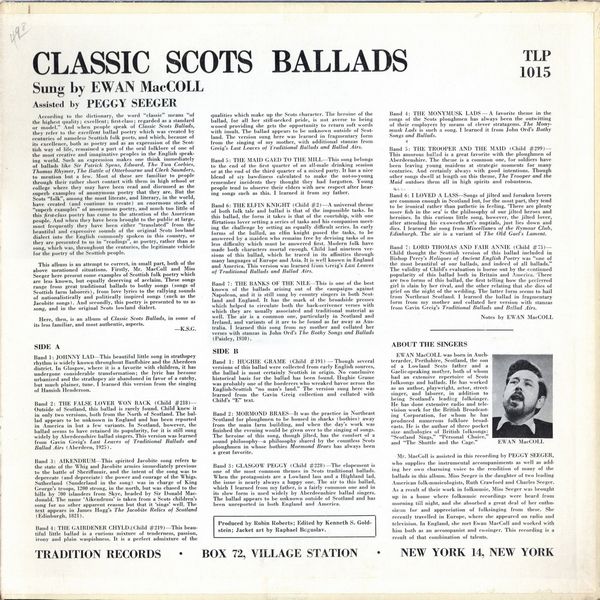
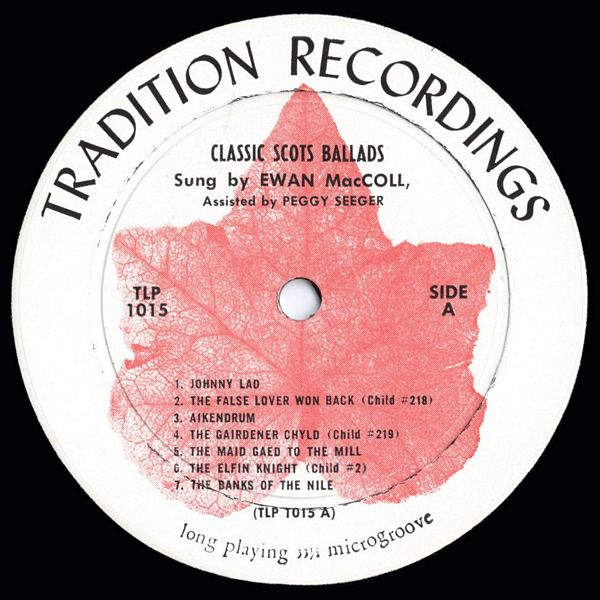
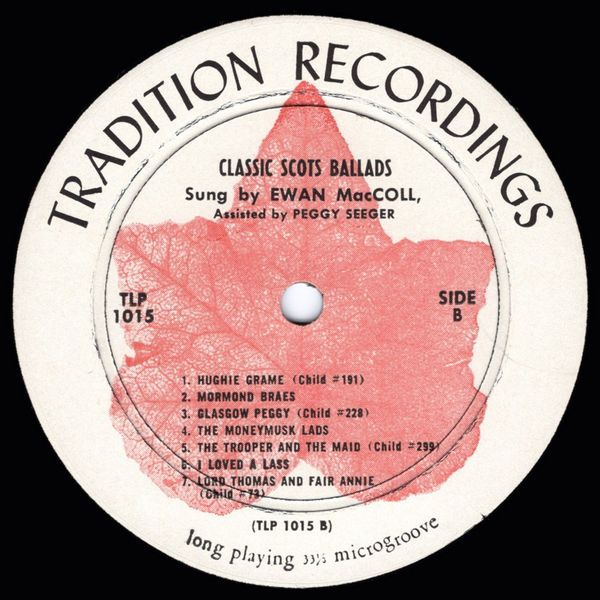 |
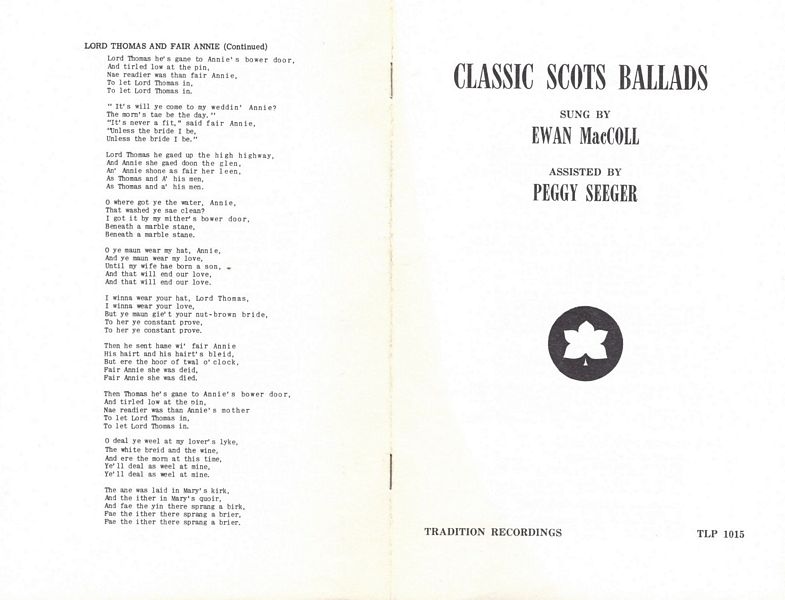
|
Sleeve Notes
According to the dictionary, the word "classic" means "of the highest quality; excellent; first-class; regarded as a standard or model." And when people speak of Classic Scots Ballads, they refer to the excellent ballad poetry which was created by centuries of nameless Scottish folk poets, and which, because of its excellence, both as poetry and as an expression of the Scottish way of life, remained a part of the oral folklore of one of the most creative and imaginative peoples in the English speaking world. Such an expression makes one think immediately of ballads like Sir Patrick Spens, Edward, The Twa Corbies, Thomas Rhymer, The Battle of Otterbourne and Clerk Sounders, to mention but a few. Most of these are familiar to people through their rather short contact with them in high school or college where they may have been read and discussed as the superb examples of anonymous poetry that they are. But the Scots "folk",' among the most literate, and literary, in the world, have created (and continue to create) an enormous stock of "superb examples" of anonymous poetry, and much too little of this first-class poetry has come to the attention of the American people. And when they have been brought to the public at large, most frequently they have been either "translated" from the beautiful and expressive sounds of the original Scots lowland dialect into the English commonly spoken in this country, or they are presented to us in "readings", as poetry, rather than as song, which was, throughout the centuries, the legitimate vehicle for the poetry of the Scottish people.
This album is an attempt to correct, in small part, both of the above mentioned situations. Firstly, Mr. MacColl and Miss Seeger here present some examples of Scottish folk poetry which are less known, but equally deserving of acclaim. These songs range from great traditional ballads to bothy songs (songs of Scottish farm laborers), from love lyrics to the rallying sounds of nationalistically and politically inspired songs (such as the Jacobite songs). And secondly, this poetry is presented to us as song, and in the original Scots lowland dialect. Here, then, is an album of Classic Scots Ballads, in some of its less familiar, and most authentic, aspects.
K.S.G.
JOHNNY LAD — This beautiful little song in strathspey rhythm is widely known throughout Banffshire and the Aberdeen district. In Glasgow, where it is a favorite with children, it has undergone considerable transformation; the lyric has become urbanized and the strathspey air abandoned in favor of a catchy, but much plainer, tune. I learned this version from the singing of Hamish Henderson.
THE FALSE LOVER WON BACK (Child #218) — Outside of Scotland, this ballad is rarely found. Child knew it in only,two versions, both from the North of Scotland. The ballad appears to be unknown in England and has been reported in America in but a few variants. In Scotland, however, the ballad seems to have retained its popularity, for it is still sung widely by Aberdeenshire ballad singers. This version was learned from Gavin Greig's Last Leaves of Traditional Ballads and Ballad Airs (Aberdeen, 1925).
AIKENDRUM — This spirited Jacobite song refers to the state of the Whig and Jacobite armies immediately previous to the battle of Sheriffmuir, and the intent of the song was to deprecate (and depreciate) the power and courage of the Whigs. Sutherland (Sunderland in the song) was in charge of King George's troops, 1200 strong, in the north, but was chased to the hills by 700 islanders from Skye, headed by Sir Donald Macdonald. The name 'Aikendrum' is taken from a Scots children's song for no other apparent reason but that it 'sings' well. The text appears in James Hogg's The Jacobite Relics of Scotland (Edinburgh, 1821).
THE GAIRDENER CHYLD (Child #219) — This beautiful little ballad is a curious mixture of tenderness, passion, irony and plain waspishness. It is a perfect admixture of the qualities which make up the Scots character. The heroine of the ballad, for all her stiff-necked pride, is not averse to being wooed providing she gets the opportunity to return soft words with insult. The ballad appears to be unknown outside of Scotland. The version sung here was learned in fragmentary form from the singing of my mother, with additional stanzas from Greig's Last Leaves of Traditional Ballads and Ballad Airs.
THE MAID GAED TO THE MILL — This song belongs to the end of the tirst quarter of an all-male drinking session or at the end of the third quarter of a mixed party. It has a nice blend of sly bawdiness calculated to make the not-so-young remember incidents they thought they had forgotten. Young people tend to observe their elders with new respect after hearing songs such as this. I learned it from my father.
THE ELFIN KNIGHT (Child #2) — A universal theme of both folk tale and ballad is that of the impossible tasks. In this ballad, the form it takes is that of the courtship, with one flirtatious lover setting a series of tasks and his companion meeting the challenge by setting an equally difficult series. In early forms of the ballad, an elfin knight posed the tasks? to be answered by a maiden who remains free by devising tasks of no less difficulty which must be answered first. Modern folk have made both characters mortal enough. Child had nineteen versions of this ballad, which he traced in its affinities through many languages of Europe and Asia. It is well known in England and America. This version was learned from Greig's Last Lecves of Traditional Ballads and Ballad Airs.
THE BANKS OF THE NILE — This is one of the best known of the ballads arising out of the campaigns o against Napoleon, and it is still sung by country singers in both Scotland and England. It has the mark of the broadside presses which helped to circulate both the hack-scrivener verses with which they are usually associated and traditional material as well. The air is a common one, particularly in Scotland and Ireland, and variants of it are to be found as far away as Australia. I learned this song from my mother and collated her verses with stanzas in John Ord's The Bothy Songs and Ballads (Paisley, 1930).
HUGHIE GRAME (Child #191) — Though several versions of this ballad were collected from early English sources. the ballad is most certainly Scottish in origin. No conclusive historical basis for the ballad has been found. Hughie Grame was probably one of the borderers who wreaked havoc across the English-Scottish "no man's land." The version sung here was learned from the Gavin Greig collection and collated with Child's "E" text.
MORMOND BRAES — It was the practice in Northeast Scotland for ploughmen to be housed in shacks (bothies) away from the main farm building, and when the day's work was finished the evening would be given over to the singing of songs. The heroine of this song, though jilted, has the comfort of a sound philosophy — a philosophy shared by the countless Scots ploughmen in whose bothies Mormond Braes has always been a great favorite.
GLASGOW PEGGY (Child #228) — The elopement is one of the most common themes in Scots traditional ballad. When the protagonists are a Lowland lass and a Highland bid. the issue is nearly always a happy one. The air to this ballad, which I learned from my father, is a fairly common one and in its slow form is used widely by Aberdeenshire ballad singers. The ballad appears to be unknown outside of Scotland and his been unreported in both England and America.
THE MONYMUSK LADS — A favorite theme in the songs of the Scots ploughmen has always been the outwitting of their employers by means of clever stratagems. The Monymusk Lads is such a song. I learned it from John Ord's Bothy Songs and Ballads.
THE TROOPER AND THE MAID (Child #299) — This amorous ballad is a great favorite with the ploughmen of Aberdeenshire. The theme is a common one, for soldiers have been leaving young maidens at strategic moments for many centuries. And certainly always with good intentions. Though other songs dwell at length on this theme, The Trooper and the Maid outdoes them all in high spirits and robustness.
I LOVED A LASS — Songs of jilted and forsaken lovers are common enough in Scotland but, for the most part, they tend to be ironical rather than pathetic in feeling. There are plenty more fish in the sea' is the philosophy of our jilted heroes and heroines. In this curious little song, however, the jilted lover, after attending his ex-sweetheart's nuptials, just lies down and dies. I learned the song from Miscellanea of the Rymour Club, Edinburgh. The air is a variant of The Old Gael's Lament.
LORD THOMAS AND FAIR ANNIE (Child #73) — Child thought the Scottish version of this ballad included in Bishop Percy's Reliques of Ancient English Poetry was "one of the most beautiful of our ballads, and indeed of all ballads." The validity of Child's evaluation is borne out by the continued popularity of this ballad both in Britain and America. There are two forms of this ballad, the first telling how the preferred girl is slain byiier rival, and the other relating that she dies of grief on the night of the wedding. The latter form seems to hail from Northeast Scotland. I learned the ballad in fragmentary form from my mother and collated her version with stanzas from Gavin Greig's Traditional Ballads and Ballad Airs.
Notes by EWAN MacCOLL
ABOUT THE SINGERS
EWAN MacCOLL was born in Auchterarder, Perthshire, Scotland, the son of a Lowland Scots father and a Gaelic-speaking mother, both of whom had an extensive repertoire of Scots folksongs and ballads. He has worked as an author, playwright, actor, street-singer, and laborer, in addition to being Scotland's leading folksinger. He has done extensive radio and television work for the British Broadcasting Corporation, for whom he has produced numerous folklore broad casts. He is the author of three pocket size anthologies of British folksongs: "Scotland Sings," "Personal Choice," and "The Shuttle and the Cage,"
Mr. MacColl is assisted in this recording by PEGGY SEEGER, who supplies the instrumental accompaniments as well as adding her own charming voice to the rendition of many of the ballads in this album. Miss Seeger is the daughter of two leading American folk-musicologists, Ruth Crawford and Charles Seeger. As a result of their work in folkmusic, Miss Seeger was brought up in a home where folkmusic recordings were heard from morning till night, and she absorbed a great deal of her enthusiasm for and appreciation of folksinging from these. She recently travelled in Europe, where she appeared on radio and television. In England, she met Ewan MacColl and worked with him both as an accompanist and co-singer. This recording is a result of that combination of talents.